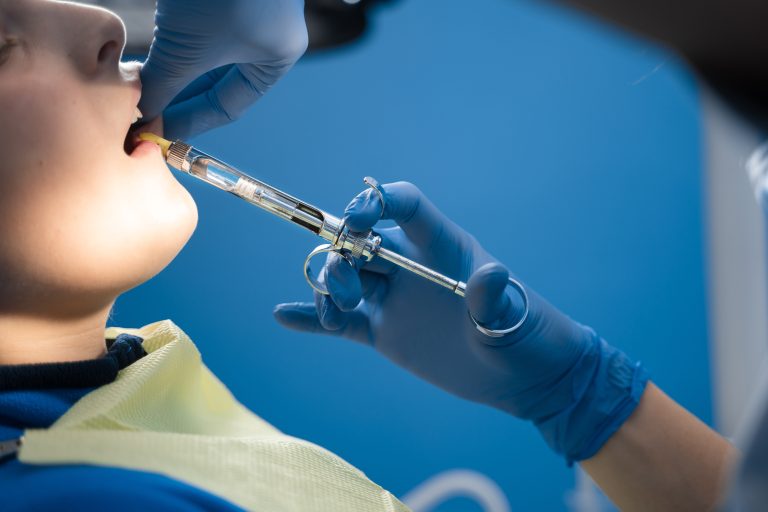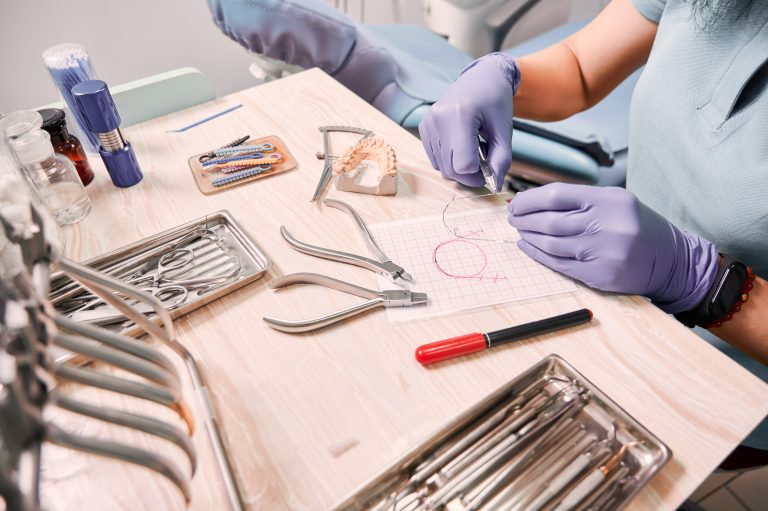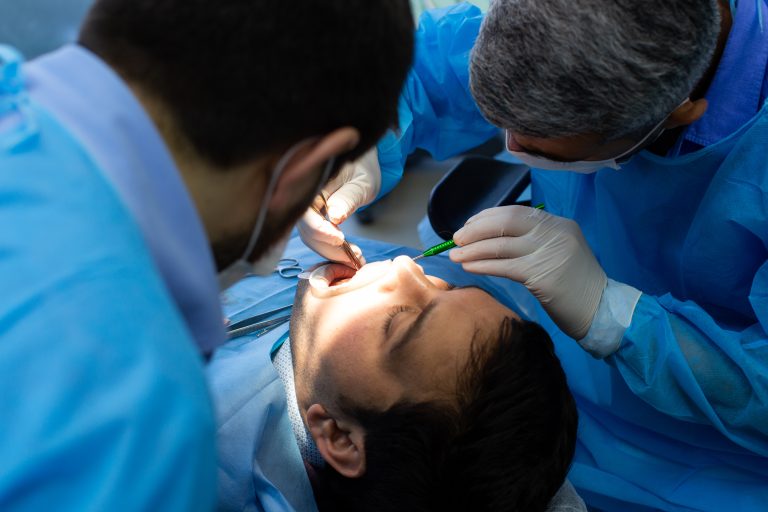


Dental surgical treatments include medical procedures that solve various problems related to oral and dental health through surgical interventions. Dental surgery is usually performed by dentists or oral surgeons. Here are common dental surgical treatments:
Tooth Extraction (Extraction):
Tooth extraction is the process of removing teeth that are usually damaged, decayed or cannot be treated for various reasons.
Dental Implants:
Dental implants involve the placement of artificial roots similar to titanium screws in place of missing teeth. An aesthetic and functional solution is achieved by placing prosthetic teeth or bridges on these implants.
Orthognathic Surgery:
It is a surgical procedure that aims to correct irregularities in the jaw and facial bones. It includes conditions such as mouth closing problems and problems with the jaw joints.
Surgical Treatment of Dental Cysts and Tumors:
The surgical removal of cysts or tumors that form in the mouth allows them to be examined for pathological analysis.
Gum Surgery:
Includes surgical interventions performed to treat gum problems. Conditions such as gum inflammation and gum recession fall into this category.
Apical Resection (Root Tip Surgery):
It is the surgical removal of infections or cysts at the root tip of a tooth.
Soft Tissue Surgery:
Includes surgical treatment of problems related to soft tissues in the mouth. This includes procedures such as oral mucosa surgery and lip surgery.
Orthodontic Surgery:
As part of orthodontic treatment, it includes surgical correction of the jaw and tooth structure. It is also called oral surgery in particular.
These surgical treatments are usually performed under local anesthesia, but general anesthesia may be required in more complex cases. Before surgical interventions, the patient’s health status and the risks of the surgical procedure are taken into consideration. After surgery, patients usually enter a recovery period and follow the dentist’s instructions.
Bize Mesaj Gönderin
Randevu Saatleri
Pazartesi – Cuma: 08:00 – 18:00
Pazar günleri ve resmi tatillerde kapalıyız.
İletişim
Yeni Mahallesi İntizam Sokak No:7 Pendik / İstanbul
0216 390 95 80
0505 372 09 26
Hasta Yorumları
Kliniğimizde, sıcak bir karşılama, şeffaf iletişim ve üstün hizmet kalitesiyle, diş sağlığı konusundaki tüm ihtiyaçlarınıza cevap vermeye hazırız.
Kaplamalarımla alakalı gitmiştim kaplamalarımın altında kistler oluşmuştu. İmplant takıldı şuan çok memnunum .Esra hanımdan önce 3 -4 tane dişçiye gittim ama hep problemler çıkardılar kaplamayı takarken dişlerimi kökten kırdılar. En son Esra hanımı önerdiler gittim ve çok memnun kaldım . Eli çok hafif ve işi bilen bir hekim Kanal tedavisi ile dişlerimin tamamını kurtardı. yakınlarıma,aileme tavsiye ettim . Ailemden de gidenler var.

TR
Esra hanıma komşumun tavsiyesi üzerine gittim iyi ki tavsiye etmiş iyi ki gitmişim çok memnunum implant yaptırdım tedavim hala da devam ediyor çok içten bir doktor hastasına güven veriyor ve çok rahatlatıyor ben de herkese tavsiye ederim

TR
Sıkça Sorulan Sorular: “Cerrahi Tedaviler“
Diş cerrahisi sonrası, doktorunuzun önerilerine uymanız önemlidir. Bunlar arasında reçeteli ilaçların düzenli olarak kullanılması, ağız hijyenine özen gösterilmesi, sıcak ve sert yiyeceklerden kaçınılması ve gerektiğinde doktora başvurulması yer alır.
İyileşme süreci prosedürün türüne, hastanın genel sağlık durumuna ve cerrahi müdahalenin karmaşıklığına bağlı olarak değişir. Ancak genellikle ilk birkaç gün hafif şişlik, ağrı ve kanama olabilir. İyileşme sürecini hızlandırmak için doktorun verdiği talimatlara uymak önemlidir.
Diş cerrahisi için uygun adaylar, genellikle genel sağlık durumu iyi olan ve cerrahi müdahaleye ihtiyaç duyan hastalardır. Ancak her hasta ve durum farklı olduğundan, cerrahiye karar verilmeden önce detaylı bir muayene yapılması önemlidir.
Diş cerrahisi, dişlerin veya ağız dokularının cerrahi müdahale gerektiren durumlarında uygulanan tıbbi bir prosedürdür. Bu prosedürler genellikle diş çekimi, implant cerrahisi, kemik grefti, yumuşak doku grefti, apikal rezeksiyon (kök ucundan cerrahi kesim) gibi işlemleri içerebilir.
